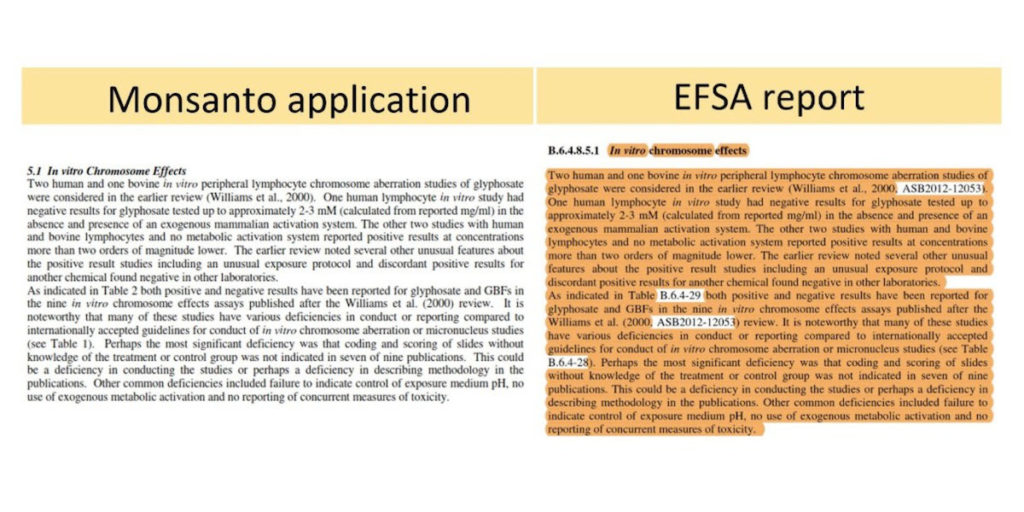European Glyphosate Safety Report Copy-Pasted Monsanto Study
ENVIRONMENT, EUROPE, EXPOSURES - EXPOSÉS, ORGANIC, GMO, GENETIC ENGINEERING, 18 Sep 2017
Lorraine Chow | EcoWatch – TRANSCEND Media Service

“Caught red-handed: #Monsanto application copy/pasted into EU food safety body @EFSA_EU report on #glyphosate. See for yourself 👀 #EFSA,” Greenpeace EU tweeted.
15 Sep 2017 – Two years ago, the debate over glyphosate‘s link to cancer took a surprising turn when the European Food Safety Authority’s (EFSA) infamously rejected the World Health Organization’s International Agency for Research on Cancer’s March 2015 classification of the weedkiller as a possible carcinogen.
However, new reporting from the Guardian reveals that the European agency’s recommendation that the chemical is safe for public use was based on an EU report that directly lifted large sections of text from a study conducted by Monsanto, the manufacturer of glyphosate-based Roundup.
The particular sections cover some of the biggest questions about glyphosate’s supposed health risks, including its links to genotoxicity, carcinogenicity and reproductive toxicity.
The revelation comes as the European Union debates whether it should extend its licensing of the world’s most popular herbicide. As it happens, the EFSA provides scientific advice to the EU and plays a key role in the authorization of thousands of products that end up in Europe’s food chain, including genetically modified organisms, pesticides, food additives and nanotech products, according to Corporate Europe Observatory, a non-profit watchdog group.
Caught red-handed: #Monsanto application copy/pasted into EU food safety body @EFSA_EU report on #glyphosate. See for yourself 👀 #EFSA pic.twitter.com/QiC9aPkuWZ
— Greenpeace EU (@GreenpeaceEU) September 15, 2017
The Guardian reports that dozens of pages from of the 4,300-page renewal assessment report (RAR) published in 2015 “are identical to passages in an application submitted by Monsanto on behalf of the Glyphosate Task Force (GTF), an industry body led by the company.”
Additionally, the paper includes a review copied from ex-Monsanto employee John Acquavella and company toxicologist Donna Farmer that “challenges the results of a study which found an association between pesticide use and non-Hodgkin lymphoma,” the Guardian report states.
EFSA has issued a statement saying, “Every scientific study is scrutinized for relevance and reliability by EU risk assessors based on the evidence contained within the study.”
A Monsanto spokesperson told the Guardian, “There was an explanation by EFSA that direct passages from the industry application were included. This should by no means be understood as EFSA’s conclusion on glyphosate.”
But Franziska Achterberg, Greenpeace EU food policy director, issued stern words against the agency in light of the new finding.
“Whether this is a question of negligence or intent, it is completely unacceptable for government bodies to pass off industry analysis as their own,” Achterberg said. “It calls into question the entire EU pesticide approval process. If regulators rely on the industry’s evaluation of the science without doing their own assessment, the decision whether pesticides are deemed safe or not is effectively in the industry’s hands. Voting against glyphosate is the last opportunity our governments have to fulfill their duty to protect us from this dangerous chemical.”
__________________________________________
Lorraine Chow is a reporter for EcoWatch.
DISCLAIMER: The statements, views and opinions expressed in pieces republished here are solely those of the authors and do not necessarily represent those of TMS. In accordance with title 17 U.S.C. section 107, this material is distributed without profit to those who have expressed a prior interest in receiving the included information for research and educational purposes. TMS has no affiliation whatsoever with the originator of this article nor is TMS endorsed or sponsored by the originator. “GO TO ORIGINAL” links are provided as a convenience to our readers and allow for verification of authenticity. However, as originating pages are often updated by their originating host sites, the versions posted may not match the versions our readers view when clicking the “GO TO ORIGINAL” links. This site contains copyrighted material the use of which has not always been specifically authorized by the copyright owner. We are making such material available in our efforts to advance understanding of environmental, political, human rights, economic, democracy, scientific, and social justice issues, etc. We believe this constitutes a ‘fair use’ of any such copyrighted material as provided for in section 107 of the US Copyright Law. In accordance with Title 17 U.S.C. Section 107, the material on this site is distributed without profit to those who have expressed a prior interest in receiving the included information for research and educational purposes. For more information go to: http://www.law.cornell.edu/uscode/17/107.shtml. If you wish to use copyrighted material from this site for purposes of your own that go beyond ‘fair use’, you must obtain permission from the copyright owner.
Read more
Click here to go to the current weekly digest or pick another article:
ENVIRONMENT:
- COP30’s Three F-Words: Failure on Fossil Fuels
- Declaration of the Peoples’ Summit Towards COP30
- Plutonium Found at Former San Francisco Naval Shipyard – Navy Faces Cover-Up Claims
EUROPE:
- European Russophobia and Europe’s Rejection of Peace: A Two-Century Failure
- An Open Letter to German Chancellor Friedrich Merz: Security Is Indivisible--and History Matters
- EU: Ministers Propose Unprecedented Detention, Sanctions, and Stripping of Rights Based on Migration Status
EXPOSURES - EXPOSÉS:
- Israeli 'Predator' Smartphone Spyware Exposed
- PCHR Documents Testimonies of Systematic Rape and Sexual Torture in Israeli Detention against Released Palestinian Detainees
- ‘No Restrictions’ and a Secret ‘Wink’: Inside Israel’s Deal with Google, Amazon
ORGANIC, GMO, GENETIC ENGINEERING:
